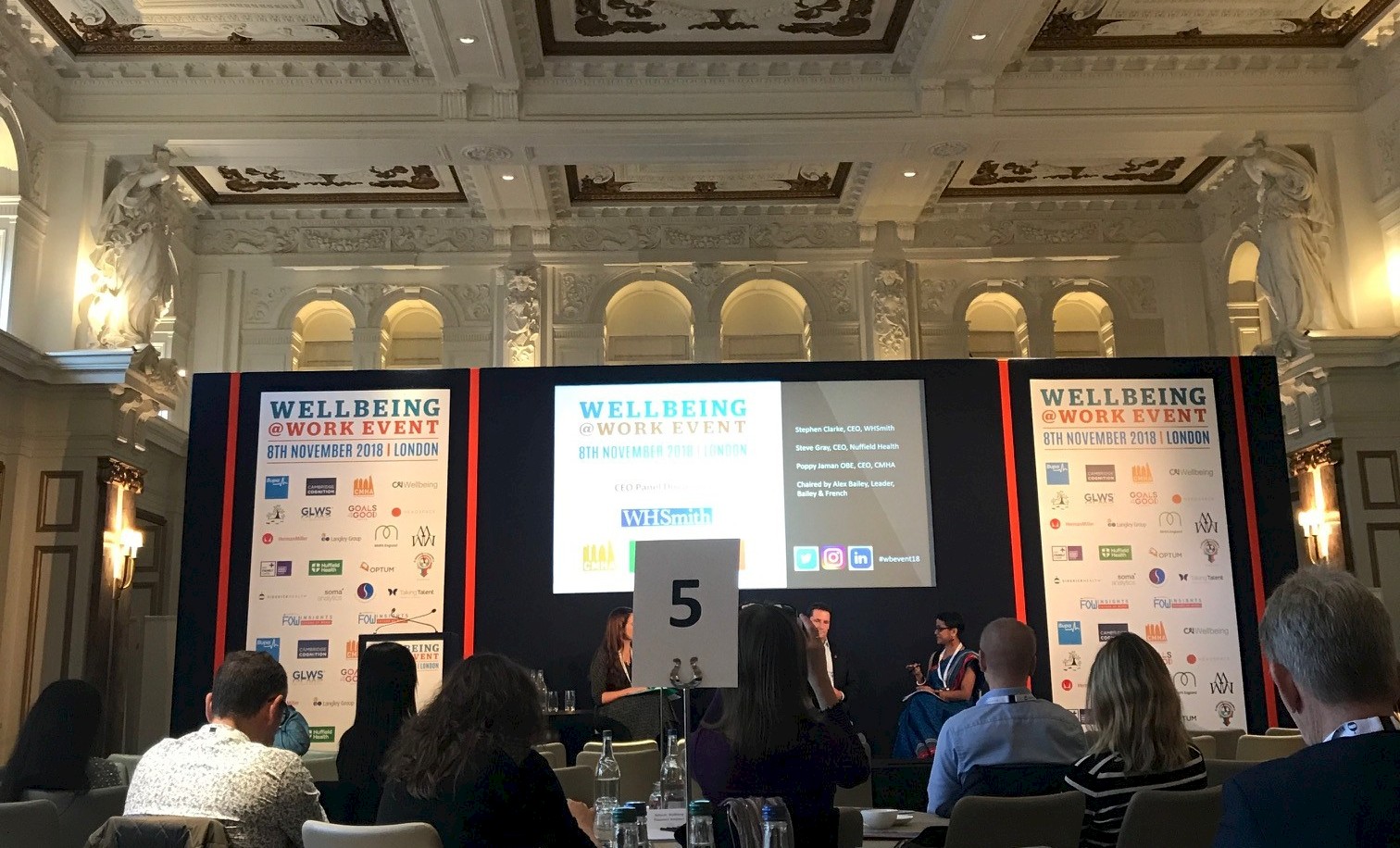
- BLOG
- Event
The 2018 Wellbeing at Work conference - our key takeaways
We recently attended the annual Wellbeing at Work conference, for the second year running. It was an inspiring, though-provoking and insightful day with a diverse and interesting line-up of speakers and panel guests.
Perhaps our most pertinent observation from the day was how quickly the conversation around workplace wellbeing seems to have matured. No longer were we talking about building a business case for wellbeing, rather, the discussions focussed on the critical importance of putting mental health at the centre of any wellbeing programme, why leaders need to be role models and how we can encourage people to not only be well, but to thrive and flourish both at work and at home.
Here are our key takeaway’s:
Mental Health
- Mental health must be on every single boardroom agenda
- Awareness and de-stigmatisation of mental illness would progress in leaps and bounds if leaders shared their own stories. Role-modelling is one of the most powerful tools we have
- Work can and should be good for mental health.
- Mental health – we have the content (i.e. we have the knowledge and the information), now we need the CONTEXT (a safe, caring, non-judgemental environment).
- Workplace stress: the lid is off. We HAVE to address it. We don’t have a choice. We have to change the narrative around workplace stress.
- Organisations can lead the way on mental health. We have a chance to progress society! Business can be used as a force for good.
Work-Life balance
- Work lives and home lives are increasingly merged. We don’t park our personal lives at the door when we walk into work.
- Leaders must model the importance of recharging and taking time off. They must set standards and show their people how to set boundaries around their wellbeing and personal time.
- There is a business case for a family friendly approach. This can remove the barriers to delivering at work regardless of whether you are a parent, carer etc.
- When people have children their meaning and purpose will have changed. We need to lean into this and create the conditions where parents can thrive. Wellbeing needs to be woven into this or we’re missing a trick.
- Why don’t we just let people work wherever, whenever and however it works for them?
- Parents often forget to look after themselves, thinking that they need to focus on their family first. But…consider the Oxygen Mask Paradigm – you have to attend to yourself first. If you’re gasping for air, you’re useless.
- Let’s help men be the fathers they might never have had – times have moved on, they should be able to be a present and engaged part of their children’s lives.
- Pursuing perfection can kill our ability to look after our wellbeing.
Workplace culture
- We can’t always remove the things that compromise our wellbeing, but we can teach people to self-regulate and look after themselves. We must empower people to do the things that are good for them. This will have a direct effect on performance and retention.
- It’s no good teaching employees resilience skills, the culture at work needs to change so resilience becomes less important.
- We need to create a culture where asking for support is the norm. Employees need a guide for getting it, managers need a guide for giving it. Vulnerability should be seen as a strength, not a weakness.
- We all have a responsibility to take hold of what our working worlds are going to look like in the future
- Try starting your meetings (where appropriate) with a ‘check in’: have everyone share three things they are feeling happy about and see how this impacts the subsequent conversations you have
- The question all employers should be asking themselves is: how can we create human flourishing in the workplace?
- If people get to use their natural strengths for 70% of their time at work they will be engaged and fulfilled
Business case
- All wellbeing efforts need to be connected to the company’s mission and raison d’etre.
- Why do wellbeing programmes fail?
- Too generic / not tailored
- Too surface level (band aid approach)
- Too narrow in focus (i.e. only focussing on physical health)
- 3 out of 4 employee in the UK could be categorised as ‘disengaged’. A business will not function unless its people are at the heart of everything it does. Leaders have to be prepared to change the way their organisation is run! What will activate and empower their people?
- Wellbeing needs are different for different people, that is often acknowledged, but they also change over time, which is often overlooked. Wellbeing priories need to be under constant review. It’s a dynamic construct.
